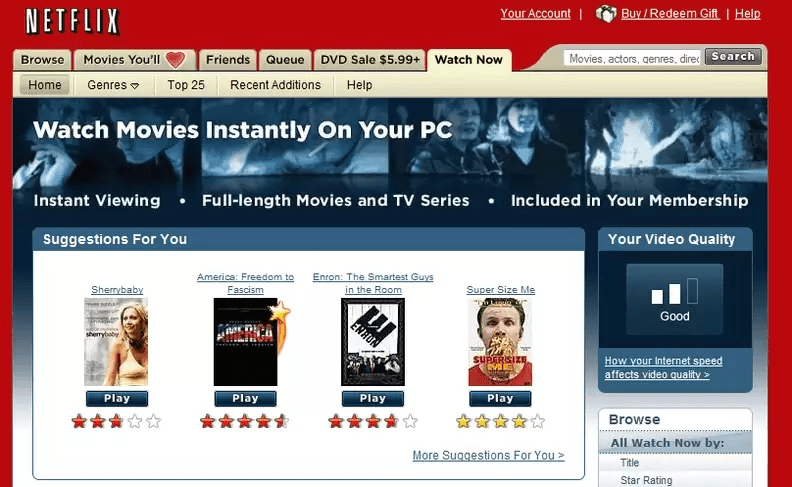Netflix, the streaming giant we all know and love, has an intriguing history and ownership structure that many may not be aware of. Today, we’ll dive into the fascinating world of Netflix’s ownership and answer the question: who owns Netflix? We will also explore the impact this global entertainment powerhouse has had on the industry. Get ready to embark on a journey that takes us from the humble beginnings as a DVD rental service to a streaming juggernaut that has forever changed the way we consume content.
Key Takeaways
Netflix is owned by a combination of individual and institutional investors, including the co-founders Reed Hastings and Marc Randolph, as well as Vanguard Group and BlackRock.
The streaming giant has revolutionized the entertainment industry worldwide with its strategic shift to streaming in 2007, investment in original content, executive team leadership into the future and global partnerships.
Its success was demonstrated through 2021’s viral phenomenon Squid Game, showing how powerful streaming platforms can be for generating global impact.
Ownership Breakdown: Who Owns Netflix in 2023?

Netflix’s ownership in 2023 is a diverse mix of individuals and institutional investors who have contributed to the company’s meteoric rise as a global entertainment leader. Co-founders Reed Hastings and Marc Randolph laid the foundation for the streaming giant, with Hastings continuing to hold a significant stake in the company.
Meanwhile, institutional investors such as Vanguard Group and BlackRock have also made substantial investments in Netflix, a publicly traded company, reflecting the confidence of the financial market in the company’s growth potential.
Related Article: Who Owns The NBA? Exploring The Organizational Structure Of The League
Reed Hastings: Co-founder and Chairperson
Reed Hastings, a visionary entrepreneur with a background in education, software engineering, and business, co-founded Netflix with Marc Randolph in 1997. Hastings holds a considerable ownership stake in the company and has sold a total of $2.22 billion worth of Netflix shares.
The steadfast commitment of this American entrepreneur has significantly contributed to Netflix’s rise as a worldwide entertainment powerhouse.
Marc Randolph: Co-founder and Former CEO
Marc Randolph, the other half of the founding duo, served as Netflix’s first CEO and played a vital role in the company’s formative period. He held 166,666 shares in the company in 2002, but his departure from Netflix in 2003 marked the end of his direct involvement with the streaming platform.
Despite his exit, Randolph’s contributions to Netflix during its early days set the stage for the company’s future success.
Institutional Investors: Vanguard Group, BlackRock, and Others
Besides the foundational efforts of the co-founders, institutional investors have significantly contributed to Netflix’s expansion. Vanguard Group, for example, holds a 7.9% ownership stake in Netflix, while BlackRock possesses 6.23% of the company’s outstanding shares.
Capital Research Global Investors is another significant stakeholder, holding 18.5 million Netflix shares, which accounts for 4.16% of the total shares outstanding. These major investments by institutional shareholders underscore the confidence in Netflix’s potential to continue its upward trajectory in the entertainment industry.
Netflix’s Evolution: From DVD Rentals to Streaming Giant
Netflix has come a long way since its start in 1997. What began as a DVD rental-by-mail service has transformed into one of the world’s leading streaming platforms, with 238.39 million streaming subscribers as paid memberships.
Through its journey, Netflix has:
Pioneered the streaming industry
Invested heavily in original content
Created a vast library of films and television series that cater to a diverse global audience.
We will now overview the pivotal stages in Netflix’s journey.
The Birth of Netflix: DVD Rental Service

In 1997, Reed Hastings and Marc Randolph founded Netflix as a DVD rental-by-mail service, providing customers with a convenient way to rent movies without having to visit a physical store. On April 18, 2023, Netflix announced they were shutting down their DVD service and their last orders would be shipped on September 29, 2023.
This groundbreaking model paved the way for future triumphs, marking only the start of an expansive odyssey.
Transition to Streaming: Pioneering the Industry

Netflix commenced its transition to streaming in 2007, recognizing the potential of streaming technology and investing heavily in its development. This shift had a profound effect on the entertainment industry, providing more convenient access to content and opening up new opportunities for content creators.
Netflix announced its pioneer status in the streaming domain through this strategic transition.
Original Content: Investing in Creative Success
As Netflix grew, the company began investing heavily in original content, with an estimated expenditure of over $100 billion U.S. dollars in the last 10 years. This strategy has paid off, as Netflix has produced numerous successful shows and movies that have attracted millions of viewers worldwide.
With half of its U.S. library now boasting original productions, Netflix has cemented its standing among the most impactful entities in the entertainment sector.
Executive Team: Leading Netflix into the Future

Behind Netflix’s continued success is an impressive executive team that leads the company into the future. This team includes Ted Sarandos, Greg Peters, and David Hyman, among others, who each play a crucial role in guiding the company’s strategic direction and ensuring its ongoing growth.
We will now examine these significant individuals and their contributions to Netflix’s triumphs.
Ted Sarandos: Co-CEO
In July of 2020, Ted Sarandos became Co-CEO alongside founder Reed Hastings. Since 2000, he has overseen all content operations and led the company’s transition to original content production, which began in 2013.
Sarandos’ efforts have significantly steered Netflix’s transformation into an international streaming behemoth.
Greg Peters: Co-CEO
In January of 2023, Reed Hastings moved into the Executive Chairman role at Netflix and announced Greg Peters as Co-CEO alongside Ted. Prior to his appointment as co-CEO, Greg served as both Chief Operating Officer and Chief Product Officer. He also held the role of International Development Officer, where he was responsible for establishing global partnerships with consumer electronics companies, Internet service providers, and multi-channel video programming distributors. These partnerships enabled Netflix to deliver movies and TV shows across a wide range of devices and platforms.
David Hyman: Chief Legal Officer
David Hyman serves as Netflix’s Chief Legal Officer, managing all legal and public policy matters for the company. In his role he ensures that Netflix adheres to all relevant laws and regulations while also safeguarding the company’s interests in any legal matters. He also serves as the company’s Secretary.
Hyman’s extensive knowledge has been invaluable in maneuvering through the intricate legal environment of the international entertainment industry.
Netflix’s Global Impact: Changing the Entertainment Landscape

Netflix’s impact on the entertainment industry is undeniable. As a global entertainment company, it has disrupted traditional media, expanded its global presence, and produced viral hits like Squid Game, forever changing the landscape of how we consume content.
In this section, we will explore how Netflix has reshaped the entertainment sphere and opened new horizons for both creators and audiences.
The Netflix Effect: Disrupting Traditional Media
The “Netflix Effect” refers to the disruption of traditional media caused by the success of the streaming giant. By providing an alternative to cable and satellite TV services, and shifting the way content is consumed through its on-demand streaming model and focus on original content, Netflix has forced competitors to adapt and develop their own streaming services.
To stay competitive, these rivals have been compelled to launch their own streaming services, and many have managed to partner with internet service providers.
Expanding Worldwide: Localized Content and Global Reach
Netflix’s global expansion strategy has been critical to its success, with the service now available in over 190 countries. Some key elements of this strategy include:
Offering localized content to cater to diverse audiences
Partnering with local telecom companies to increase accessibility
Continuously growing its international user base
By implementing these strategies, Netflix has been able to successfully expand its reach and maintain its position as a leading streaming service worldwide.
Squid Game Phenomenon: The Power of Viral Hits
The success of Squid Game, a hit show that was released by Netflix in 2021, demonstrates the power of viral hits and the potential for global impact through streaming platforms. In this wildly popular show, hundreds of cash-strapped contestants accept an invitation to compete in children’s games for a tempting prize, but the stakes are deadly.
The year it was released, 111 million Netflix accounts viewed the show and it became Netflix’s number one release as of October of 2021.
This phenomenon highlights the immense reach and influence that streaming platforms like Netflix can have on the entertainment industry and beyond.
Summary
In conclusion, Netflix’s journey from a DVD rental-by-mail service to a global streaming giant has been nothing short of extraordinary. Its diverse ownership, innovative evolution, and visionary executive team have all contributed to the company’s incredible success. As the world continues to embrace streaming as the primary means of consuming content, Netflix’s impact on the entertainment landscape and its potential for future growth remain strong. As we look forward to what the future holds for this entertainment powerhouse, one thing is certain: Netflix has forever changed the way we watch, create, and share stories.
Frequently Asked Questions
Who is Netflix owned by?
Netflix is owned by its shareholders, with ownership distributed among numerous individual and institutional investors. Prominent individual investors include co-founder and former CEO Reed Hastings, who owns a 1.7% stake, and Vanguard Group Inc., which holds 35.5 million shares.
Are the Netflix founders billionaires?
Reed Hastings, the co-founder and executive chairman of Netflix, has a net worth of $2.4 billion and recently made a $100 million investment in Powder Mountain, the largest ski resort in the US. Therefore, he can be classified as a billionaire.
Where is Netflix based?
Netflix is based in Los Gatos, California, USA and was founded in 1997 by entrepreneurs Reed Hastings and Marc Randolph.
When did Netflix transition from DVD rentals to streaming?
Netflix started transitioning to streaming in 2007, marking the beginning of an era of convenient on-demand content.
What is the total number of Netflix paid memberships in 2023?
Netflix has an estimated 238.39 million paid memberships as of 2023.




